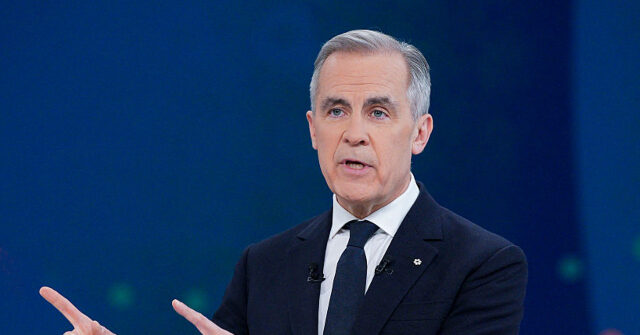Canada held prime minister debates on Wednesday and Thursday, the first in French and the second in English. The Thursday debate was, by all accounts, a more spirited joust between interim Prime Minister Mark Carney and his rivals from the Conservative, NDP, and Bloc Quebecois parties.
Carney, an investment company executive and former central banker who has never been elected to anything, ascended to leadership of the Liberal Party of Canada and the prime minister’s office when deeply unpopular Prime Minister Justin Trudeau resigned in March.
Trudeau’s departure, and President Donald Trump’s tariffs, revived the Liberal Party’s fortunes after a year of running double-digit polling deficits against Pierre Poilievre and his Conservative Party of Canada. At times, the Liberals sank deep enough in the polls to give Jagmeet Singh and his New Democratic Party (NDP) a legitimate claim as the leading left-wing party in Canada.
Carney went into the Montreal debate on Thursday as the front-runner, so Poilievre, Singh, and Bloc Quebecois leader Yves-Francois Blanchet directed most of their fire at him.
Poilievre is currently running seven points behind Carney, a massive fall from his onetime perch as a 20-point leader.
Singh’s tumble in the post-Trudeau environment is even more catastrophic — he went from arguing that NDP was the new leader on the Left to looking at an utter wipeout in the election, with polls showing his party could lose 19 of the 24 seats it currently holds in the legislature. The Bloc Quebecois is also looking at big losses, as Canadian voters appear to be consolidating around the Liberals and Conservatives.
Singh and Blanchet are running in the single digits, so Poilievre is the only plausible challenger at this point, but it seems unlikely that large numbers of left-leaning voters who dislike Carney will rally behind him. Blanchet openly offered to partner with Carney in a coalition government during the Thursday debate. The latest polls show there are few undecided voters left for Poilievre to grab.
Canada has two other minor parties that contend for the prime minister’s office, the Greens and the People’s Party, but neither had enough support to qualify for a space on the debate stage.
The left-wing BBC felt Carney stumbled a bit during the French-language debate on Wednesday but did a fairly decent job of holding his own against the other three major candidates on Thursday. The Liberal leader suffered some bruises but avoided the knockout punch Poilievre was hoping to throw.
Poilievre came closest to putting Carney on the canvas, with an assist from Blanchet, by challenging the notion that Carney would offer anything better than the failed policies of Trudeau.
“How can we possibly believe that you are any different?” Poilievre asked.
“You claim you are different — you need to prove you are better,” Blanchet seconded.
Carney insisted he is a “very different person” from his predecessor.
“You spent years running against Justin Trudeau and the carbon tax and… they’re both gone, okay, they’re both gone,” he snapped at Poilievre. The tax he was referring to was only suspended on April 1, so it’s not exactly out of bounds for a leadership debate.
Carney also seemed close to losing his cool when Poilievre hammered him on the housing crisis, a major theme of the Conservative campaign. Carney stopped himself from delivering an angry retort by saying, “I’ll be polite.”
One of the sharper exchanges between the Liberal and Conservative candidates came when Carney needled Poilievre for refusing to obtain a security clearance.
Poilievre has long maintained he does not want a clearance while he is running for office because getting one would prevent him from speaking out on topics relevant to Canadian national security — such as onetime Liberal parliamentary candidate Paul Chiang, who dropped out of the race after video surfaced of him suggesting his Conservative opponent Joe Tay should be handed over to Chinese secret police.
Poilievre did a solid job of presenting his vision for greater economic growth under a more limited government with lower taxes, while Carney insisted the government needs to play a “catalytic” role in the economy.
It remains to be seen if a critical mass of Canadian voters is ready to give Poilievre’s vision a try, or can be persuaded to let the technocratic Carney bring his putative private sector experience to bear on fixing the Big Government machine that Trudeau ran into the ground. Meanwhile, Singh argued for bigger government spending and suggested the high-rolling Carney would betray the interests of Canadians in favor of his business interests.
All three of the opposition candidates peppered Carney with questions about his career with Brookfield Asset Management and its tax havens in the Caribbean, some details of which he has refused to disclose.
Carney insisted that Brookfield should be seen as a “Canadian success story” whose investments benefit pensioners.
“I always acted with integrity, served the shareholders of Brookfield when I was there,” he insisted.
Pollster Nik Nanos told the Globe and Mail that Carney did well enough at the debate to maintain his lead.
“This was really the last chance for Pierre Poilievre to directly try to change the trend line. There was no major game changer in the debate to make people rethink who they are supporting,” he said.
“Somehow Poilievre has to hope that there is some kind of major blunder or revelation relating to Mark Carney. I don’t think a policy platform will turn things around because people aren’t voting based on platform. They are voting on who is best to manage the risks related to Donald Trump,” he added.
Writing at the National Post on Thursday, columnist Jamie Sarkonak offered an alternative view that Poilievre will be seen as the “easy” winner of the debate, once the dust settles and voters have a chance to digest all that was said.
Sarkonak felt Poilievre “ran circles” around a “sluggish” Carney and the allegedly annoying, but largely irrelevant, Jagmeet Singh. Blanchet also tore a few chunks out of Carney, Sarkonak posited, even if he ended up offering to throw in with him on a coalition government:
No matter what he did, Carney just couldn’t shake Blanchet. The Bloc leader accused Carney of promising to force pipelines through Quebec in English, and the opposite in French. He berated Carney for bringing up child care and health, matters of provincial responsibility. He accused Carney of not sufficiently hearing out the concerns of Quebec Premier François Legault. He decried Carney for associating with the Century Initiative, the advocacy group urging massive population growth, by hiring one of its founders as an adviser.
In contrast to Singh’s lukewarm attempts at hot takes, Blanchet actually sizzled. He mocked Carney’s crisis management skills, as the latter was anti-Brexit while he was serving as the United Kingdom’s central banker (the country ultimately left the European Union). As for Carney’s negotiating skills, Blanchet wondered aloud what deals the Liberal leader has negotiated aside from tax havens in the Caribbean.
Sarkonak’s big-picture view was that Poilievre offered a far superior vision for prosperity in post-Trudeau Canada, and demolished Carney on crime and national security.
“Today, many of you are worried about paying your bills, feeding your families or ever even owning a home. You’re worried your kids are in danger, but I’m here to say, it doesn’t have to be this way. With change, we can restore the Canadian promise so that hard work gets you a beautiful house on a safe street under a proud flag,” Poilievre said in what Sarkonak saw as a slam-dunk closing argument.



